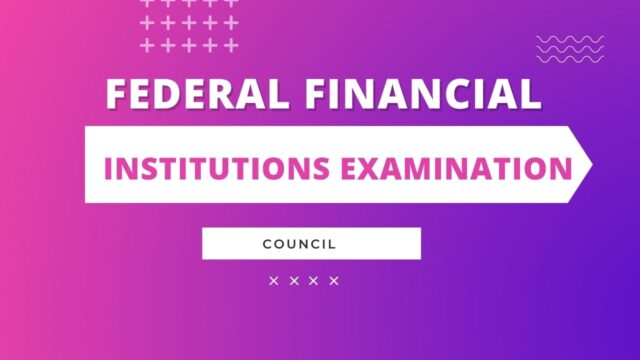
What is the Federal Financial Institutions Examination Council and what do they do
The Federal Financial Institutions Examination Council (FFIEC) is a U.S. government organization that develops and recommends policies for the regulation of financial institutions. The Council is composed of five member agencies: the Board of Governors of the Federal Reserve System, the Federal Deposit Insurance Corporation, the National Credit Union Administration, the Office of the Comptroller of the Currency, and the Consumer Financial Protection Bureau.
The Council’s mission is to promote the safety and soundness of depository institutions and protect consumers from unfair or deceptive practices. To achieve this mission, the Council conducts examinations of financial institutions, produces supervisory guidance, and engages in other activities to foster compliance with applicable laws and regulations. In addition, the Council serves as a forum for cooperation and coordination among its member agencies on supervisory matters.
The history of the FFIEC
The Federal financial Institutions Examination Council (FFIEC) was created in 1979 in response to the Public Law 96-221, which amended the Federal Deposit Insurance Corporation Improvement Act of 1975. The council was created to prescribe uniform principles and standards for the federal examination of depository institutions and to make recommendations to promote uniformity in the supervision of these institutions. The council is composed of five member agencies: the Board of Governors of the Federal Reserve System, the Federal Deposit Insurance Corporation, the National Credit Union Administration, the Office of the Comptroller of the Currency, and the State Liaison Committee. The FFIEC also has a advisory state liaison committee made up of five representatives from state bank supervisor agencies.
The FFIEC’s guidance is used by examiners from the member agencies when they are examining financial institutions for compliance with consumer protection laws and regulations. The council provides training and educational resources for examiners on consumer compliance topics. In addition, the FFIEC’s website includes publications on various consumer compliance topics, supervisory insights articles, and Frequently Asked Questions. Financial institutions can use these resources to improve their compliance management systems.
How the FFIEC regulates financial institutions
The Federal Financial Institutions Examination Council (FFIEC) is an interagency body that develops examination policies and promotes uniformity in the supervision of financial institutions. The Council is comprised of five member agencies: the Board of Governors of the Federal Reserve System, the Federal Deposit Insurance Corporation, the National Credit Union Administration, the Office of the Comptroller of the Currency, and the Consumer Financial Protection Bureau. The FFIEC provides guidance to examiners on a wide range of topics, including consumer protection, anti-money laundering, and cybersecurity. In addition, the Council oversees the development of interagency supervisory policies and practices. By working collaboratively, the FFIEC helps to ensure that financial institutions are safe and sound and that consumers are protected from abusive practices.
The role of the FFIEC in preventing another financial crisis
The role of the Federal Financial Institutions Examination Council (FFIEC) is to promote uniformity in the supervision of financial institutions. The council is made up of representatives from five federal agencies: the Board of Governors of the Federal Reserve System, the Federal Deposit Insurance Corporation, the National Credit Union Administration, the Office of the Comptroller of the Currency, and the Consumer Financial Protection Bureau. In recent years, the FFIEC has focused on risk management and consumer protection in an effort to prevent another financial crisis. By working with financial institutions to identify and address risks early on, the FFIEC hopes to make the banking system more stable and resilient. In addition, the council has also implemented new rules and guidelines to protect consumers from predatory lending practices. By taking these proactive steps, the FFIEC is working to ensure that another financial crisis does not occur.
The benefits of compliance with the FFIEC’s regulations
The FFIEC compliance regulations are in place to protect consumers and ensure the stability of the financial system. Compliance with these regulations helps to prevent fraud and abuse, and promotes fair and transparent practices. These regulations also help to protect financial institutions from legal liability. In addition, compliance with the FFIEC’s regulations helps to ensure that consumers have access to their accounts and can make informed decisions about their finances. Finally, compliance with the FFIEC’s regulations helps to foster confidence in the banking system and contributes to the overall stability of the financial system.
Some of the challenges that financial institutions face in complying with FFIEC regulations
Financial institutions face a range of challenges when complying with FFIEC regulations. One challenge is the ever-changing regulatory environment. Financial institutions must continually adapt their compliance processes to keep up with new and revised regulations. Another challenge is the complex and interconnected nature of the financial system.
Financial institutions must take into account the risks posed by their counterparties and other market participants. Additionally, financial institutions must manage their own risks while also complying with regulations designed to protect consumers and promote stability in the financial system. These challenges require financial institutions to have robust compliance programmes in place. However, even with strong compliance programmes in place, financial institutions can find it difficult to meet all of the requirements set out by the FFIEC. This is why it is essential for financial institutions to work closely with their regulators to ensure that they are meeting all of the necessary requirements.
Why compliance is important for financial institutions
Financial institutions are subject to a variety of laws and regulations designed to protect consumers and promote the stability of the financial system. Compliance with these rules is essential for keeping customers safe and preventing costly penalties. In recent years, regulators have become increasingly focused on compliance, issuing larger fines for violations and holding executives accountable for failings. As a result, compliance has become an essential part of doing business in the financial sector. By ensuring that their policies and procedures are up to date, financial institutions can help to create a safer and more stable financial system.
How complying with FFIEC regulations can help protect consumers
Complying with FFIEC regulations helps to protect consumers in a number of ways. First and foremost, these regulations help to ensure that financial institutions are providing accurate and transparent information to their customers. This includes disclosing fees and terms clearly, as well as ensuring that advertising is not misleading. In addition, FFIEC regulations help to protect consumers from identity theft and fraud by requiring financial institutions to put strong security measures in place. Finally, these regulations also provide for a mechanism for consumers to file complaints if they feel that they have been treated unfairly. By complying with FFIEC regulations, financial institutions can help to create a safe and fair environment for their customers.


































